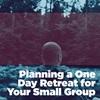When small-group leaders don't honor the start and finish times of their group gatherings, they can leave people frustrated or stressed. You don't want people feeling trapped in your living room—meaning, you don't want to create a situation where people forego leaving at the agreed upon time because they don't wish to be rude. The end result is usually that people don't return, or else they "stick it out," which can make attending the group feel like another chore to get through during the week instead of a refreshing wellspring of community that replenishes them for the journey.
Starting and ending on time is an important part of building community with a purpose and mission. For that reason, here are some ideas to consider that can help you, the small-group leader, honor what was initially communicated about your group's meeting time:
- Set the expectation of starting on time and ending on time at the beginning of a new season or study for your group. Let your group know that you will strive to honor the start time and end time that was posted.
- Include time commitments in the communication of your group's values (covenant) or list of "standard operating procedures." Agree on a starting and ending time for everyone's sake.
- Allow the "fellowship time" to serve as bookends for your small-group format. If you start and end your group gathering by allowing members to "hang out," you naturally give people a place to arrive and leave on time.
- Plan a time-sensitive agenda. Be aware that you can only get through so much material (or through so many experiences) in a single gathering. So, if the Bible study or Scripture your group is studying comes with pre-written questions, plan to get through only half of them. Determine which items are most important for your group to cover together and be ready to leave the rest behind.
- Double whatever time you've planned for prayer, because the sharing of prayer needs almost always takes longer than expected. This certainly isn't a bad thing. A lot of ministry happens as people open up about what's on their hearts.
- If it's tough for you as the facilitator to keep track of the time, then appoint somebody else to be the time-keeper. Establish this in front of the whole group in a light-hearted way. Ask this person to give you a signal when it's time to get started or wrap it up.
- Invite your co-leader or the whole group to help out with starting and ending on time. People can always hang out after the "official end time" of your group and fellowship. Just be sure to clear any arrangements for post-meeting fellowship with your host. And on the host's behalf, let everyone know when they have to say good-bye so your host can get ready for the next day of life.
Maybe you're wondering: Is it every appropriate to continue a group meeting beyond the designated ending time? And of course the answer is yes. Hopefully there will be times when the Holy Spirit is moving as you near your group's ending time, and both you and the other group members don't want to stop.
In that situation, don't stop; just pause. Gently acknowledge the following things out loud:
- The time
- That you feel God is doing something significant
- Even though it's everyone's heart to stay, some need to go because of kids (bedtime or babysitter), work hours, other commitments, and so on.
- It's okay for people to head out—release them to get up and go, and invite those who wish to stay to do so.
For example, here's what that might sound like: "Hey everyone, I just want to let you know that it's 8:30pm, which is when we usually finish up. However, I feel like the Lord is doing a special work in John's life right now and we're to continue to pray over the things he just shared with us. I know you'd all love to stay and be together through this, but I know some of you have to take care of some things at home tonight. If you need to head out, please feel free to do that. It's okay to go now. We'll see you at church this weekend or at our next group time."
—Reid Smith is the Community Life pastor of the multi-site Christ Fellowship Church in Palm Beach Gardens, Florida, and the founder of the 2orMore small-group leadership training and resource ministry.









